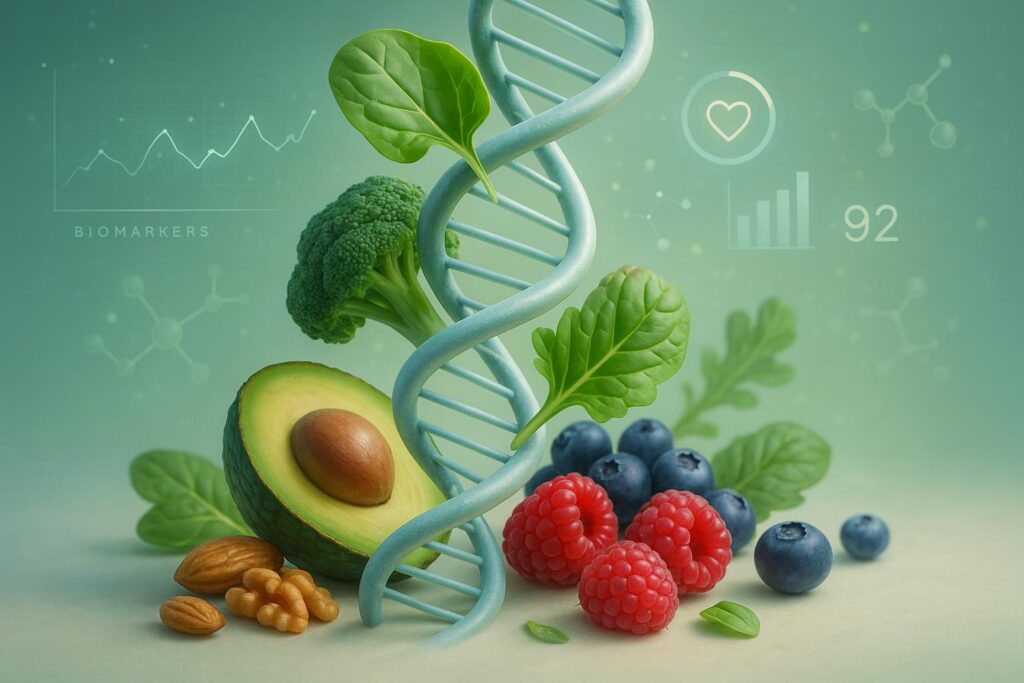Let’s be real for a second. Have you ever felt like you’re playing a guessing game with your health? You’re chugging green smoothies, saying a tearful goodbye to pizza, and… crickets. The scale doesn’t budge, your energy is still MIA, and you’re left wondering what you’re doing wrong.
If this sounds familiar, you’re not alone. The health and wellness world is screaming with one-size-fits-all advice, but here’s the secret they don’t tell you: your body is unique. What makes your best friend thrive might make you feel… well, blah. This is where we stop guessing and start biohacking. We’re talking about nutritional biohacking, a game-changing approach that swaps generic meal plans for a diet built specifically for your genetic makeup and your body’s real-time data.
This isn’t about another restrictive fad. It’s about becoming the CEO of your own health. By using cutting-edge science to listen to your body, you can finally create a personalized roadmap to unlock boundless energy, laser-sharp focus, and vibrant long-term health. Ready to stop guessing and start living? Let’s get into it.
Ditching the Dogma: Why One-Size-Fits-All is Dead
For years, we’ve been fed the same old story: count calories, cut fat, eat this, not that. While the advice was well-meaning, it missed a huge piece of the puzzle: us. Our individuality. The truth is, our bodies are incredibly complex systems, and how we respond to food is influenced by a whole host of factors, from our DNA to the trillions of tiny microbes living in our gut.
This is precisely why your coworker can’t stop raving about the keto diet, but it left you feeling foggy and exhausted. It’s why some people feel amazing on a plant-based diet, while others need a little more animal protein to feel their best. The era of dietary dogma is over. The future of nutrition isn’t just personal; it’s personalized.
Your Body’s Secret Manual: Unlocking Your Genetic Code
What if you had an instruction manual written specifically for your body? That’s exactly what nutrigenomics—the science of how your genes and your food interact—offers. Your DNA is a treasure trove of information, revealing secrets about everything from how you process that morning coffee to which foods will truly make you shine.
Genetic testing can be a total game-changer, uncovering insights like:
- Your Ideal Fuel Mix: Are you built to run on carbs, or does your body prefer fats?
- Hidden Nutrient Needs: Do you have a genetic quirk that makes you prone to low levels of Vitamin B12 or D?
- Food Sensitivities: Could that nagging bloat be a sign that your body isn’t a fan of gluten or lactose?
- Caffeine Jitters: Finally understand why you can have an espresso after dinner and sleep like a log, while your friend is wired until sunrise.
Take the MTHFR gene, for example. A common variation can make it tough for your body to use folic acid (the synthetic stuff). Armed with that knowledge, you could focus on getting more folate from natural sources like spinach and lentils. It’s a simple switch, but it’s a perfect example of biohacking in action.
Companies like 23andMe or GenoPalate can give you a peek into your genetic blueprint. Once you have this data, you can start to connect the dots and build a smarter plate. For a deeper dive into how nutrition can fuel your performance, check out our article on Beyond Calories: How Biohacking Nutrition Fuels Peak Athletic Performance.
Beyond Genes: Listening to Your Body’s Live Feedback
Your genes are the blueprint, but biomarkers are the live feedback loop. Think of them as real-time data points that tell you exactly what’s happening inside your body right now. You can track these through blood tests, and they give you the power to see how your diet and lifestyle are truly impacting your health.
Here are a few of the big players in the biomarker world:
| Biomarker | What It Tells You |
|---|---|
| Fasting Glucose | Your body’s blood sugar management skills. |
| Triglycerides | The amount of fat in your blood; a key marker for heart health. |
| HDL Cholesterol | The “good” cholesterol that acts like a cleanup crew for your arteries. |
| hs-CRP | A sensitive marker for inflammation, a hidden driver of many chronic diseases. |
| Vitamin D | A crucial player in everything from your immune system to your mood. |
When you track these markers, you take the guesswork out of wellness. You might discover that a week of eating less sugar dramatically improves your fasting glucose, or that adding more healthy fats boosts your HDL. This is data-driven health at its finest.
Your Second Brain: The Gut-Health Revolution
We can’t talk about personalized nutrition without talking about your gut microbiome. This bustling metropolis of trillions of bacteria in your gut is your “second brain,” and it has a massive say in everything from your digestion and immunity to your mental clarity and mood.
And just like your fingerprint, your gut microbiome is one-of-a-kind. The food you eat directly shapes this inner ecosystem. A diet bursting with diverse, fiber-rich plants helps your good gut bugs flourish. On the flip side, a diet heavy on processed junk can lead to an unhappy gut, a state known as dysbiosis.
By understanding your unique gut profile (which you can do with a simple stool test), you can start to feed your gut what it truly needs. This might mean adding in more probiotic-rich foods like kimchi and yogurt, or upping your intake of prebiotic fibers from foods like garlic and asparagus. It’s a powerful way to support your health from the inside out. Curious about how specific diets impact gut health? Our post on the Ketogenic Diet and Gut Health is a great place to start.
Your Biohacking Action Plan
Ready to start your own biohacking adventure? It’s simpler than you think. Here’s your four-step plan:
- Get Your Data: Start with genetic testing and a baseline biomarker panel. This is your foundation.
- Find Your Focus: Work with a pro or do your own research to understand your results. Where are your biggest opportunities for improvement?
- Make Small, Smart Changes: Don’t try to change everything at once. Pick one or two things to focus on, like adding a new vegetable to every meal or cutting out sugary drinks.
- Track, Tweak, Triumph: Pay attention to how you feel. Keep a journal. Re-test your biomarkers in a few months. See what’s working and what’s not, and adjust accordingly.
The Future of Health is You
Nutritional biohacking isn’t just another wellness trend. It’s a movement. It’s about shifting from passive patient to empowered CEO of your own health. By embracing your individuality and using data to make smarter choices, you can unlock a level of vitality you never thought possible.
Ready to dive deeper into the world of biohacking? Explore all the resources we have to offer here at fitonear.com and start building a healthier, more optimized you.
References
- Singar, S., Nagpal, R., Arjmandi, B. H., & Akhavan, N. S. (2024). Personalized Nutrition: Tailoring Dietary Recommendations through Genetic Insights. Nutrients, 16(16), 2673. https://doi.org/10.3390/nu16162673
- Marchese, H. (2024, November 29). Biohacking diet and nutrition: 9 effective hacks for health and longevity. Nucleus. https://mynucleus.com/blog/biohacking-diet
- Abeltino, A., Hatem, D., Serantoni, C., Riente, A., De Giulio, M. M., De Spirito, M., De Maio, F., & Maulucci, G. (2024). Unraveling the Gut Microbiota: Implications for Precision Nutrition and Personalized Medicine. Nutrients, 16(22), 3806. https://doi.org/10.3390/nu16223806

